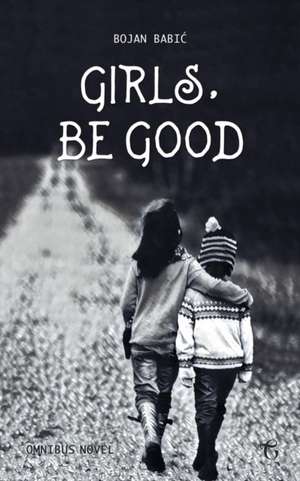Girls, be Good
Autor Bojan Babi¿en Limba Engleză Paperback – dec 2016
We then follow the little lemurs as they go through some emotionally intense stories that represent a cartography of misfortune, set in the period between the execution and exhumation of the Romanian dictator, Ceausescu, and his wife. The lemurs bear witness to physical and mental abuse, inhumane treatment and molestation of young girls around the world. In each of the stories, a figure in authority at some point orders the girls to follow orders, no matter how destructive this may be for the girl, either physically or mentally. The authorities devastate the weakest beings, merely in order to satisfy the norms of society or to save themselves from being outcasts.
The main character, the young woman who writes these stories, has a father who has sold her soul to the devil, just so that he could obtain two decades of life outside the law and without fear of punishment. The young woman herself, meanwhile, has a pact with the devil of her own.
Babic finds the evil in places where we are not usually able to see it, and records it with painstaking attention to detail. In this book, he brings us a story about the accountability of criminals, but also about the accountability of victims towards themselves. This is a story about a helplessness that is learned. The book analyses, at times in an extremely brutal and uncompromising manner, the relationships between victims and the evil authorities - relationships that are never as straightforward as we might think. The sheer brutality of the work might turn some readers away. If we find the strength to stick with it till the end, however, this book might just prove to be what Kafka described as "an axe for the frozen sea within us".
Translated by Natasa Miljkovic.
Preț: 127.18 lei
Nou
Puncte Express: 191
Preț estimativ în valută:
24.34€ • 25.14$ • 20.26£
24.34€ • 25.14$ • 20.26£
Carte tipărită la comandă
Livrare economică 26 martie-09 aprilie
Preluare comenzi: 021 569.72.76
Specificații
ISBN-13: 9781911414261
ISBN-10: 1911414267
Pagini: 170
Dimensiuni: 127 x 203 x 9 mm
Greutate: 0.19 kg
Editura: GLAGOSLAV PUBLICATIONS B.V.
ISBN-10: 1911414267
Pagini: 170
Dimensiuni: 127 x 203 x 9 mm
Greutate: 0.19 kg
Editura: GLAGOSLAV PUBLICATIONS B.V.
Notă biografică
Bojan Babi¿ was born in Belgrade in 1977. He studied at the Department of Serbian and World Literature at the Faculty of Philology, in Belgrade, and later gained a Master's degree from the same department. Before commencing his studies in Serbian and World Literature, he was a singer in a little-known heavy metal/grunge band. Over the last ten years, he has worked as a prolific and acclaimed copywriter and associate creative director at a big advertising agency, winning numerous awards. Bojan Babi¿ began writing in the middle of the last decade of the twentieth century (when the war in the former Yugoslavia was raging), in his teenage years and early twenties. In that period, he wrote and published two books: Noises in prose - hermetic poetry with "delicate language tendencies and surreal stoicism in a world with no hope", and PLI-PLI, a book of flash-fiction. What motivated him to start writing was an inability to cope with the situation of absolute violence and destruction all around him, on the one hand, and his youthful fascination with the poets of the French, German and Soviet avant-garde, on the other. Those first attempts thus came about as a result of activism and escapism at the same time. Ever since he took his first steps in writing, he has been concerned by questions that are still dominant themes in his literature today: irreparable harm, a loss of faith in the idea that things can get any better, a pessimism about history and civilization which, over time, turns into anthropopessimism, a loss of belief in human kind. These and many other questions have, in various ways, from various perspectives and using various poetic strategies, arisen in Babic's books. With no definite answer. As one critic wrote of Babic's novel Inhuman comedy, realistic prose seems too feeble and naïve to describe the unbelievable reality that is happening to us, hence Babic uses surreal tactics to talk about it. If one had to come up with a name for it, it would be called dystopic surreal realism, in which he always adds a pinch of dark humor, irony and an oneiric atmosphere. Critics have compared his prose to that of Don DeLillo, Boris Vian and Roberto Bolanjo. Babic won an award from the Borislav Peki¿ Foundation in 2011. His novel Illegal Parnassus, published in 2013, was shortlisted for the biggest national literary award, the NIN prize; it was also shortlisted for the biggest regional award (for Bosnia and Herzegovina, Montenegro, Croatia and Serbia) - the Me¿a Selimovi¿ prize. Critics have reacted very strongly to his last three novels. He has appeared as a guest teacher in several creative writing schools. He has had prose, poetry and essays published in a large number of magazines and anthologies in Serbia and abroad.
